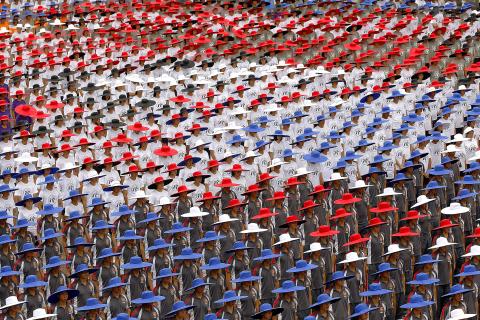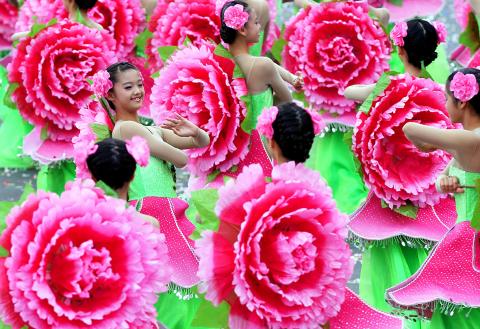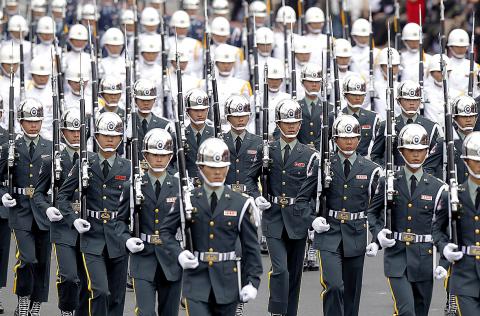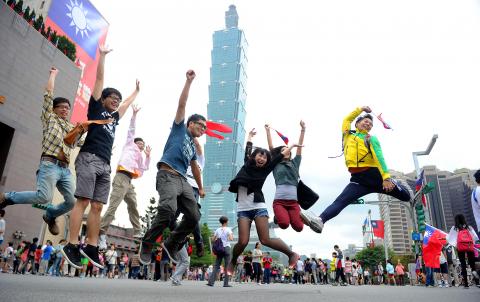President Ma Ying-jeou (馬英九) pledged yesterday to work through the economic crisis and open up Taiwan’s market to more foreign investment, promising to address public concerns by presenting solid solutions to stagnant salaries and high unemployment.
In his National Day address titled “Forging Ahead Together with Composure in the Face of Adversity,” Ma sought to tackle economic issues and said his administration would focus its efforts on boosting the development of service industries, raising salaries and eliminating investment barriers to create more job opportunities.
“To bolster of national security and Taiwan’s interests, we will relax regulations on foreign investments to create a friendlier and more convenient investment environment. In the future, liberalization will become the norm and barriers the exception,” Ma said at a National Day ceremony in front of the Presidential Office.

Photo: Pichi Chuang, Reuters
Ma said relaxing regulations on foreign investment would create a better investment environment and more jobs, and he promised that the government would strike a balance between labor rights and foreign investment.
“Although Taiwan’s economy has grown over the past years, many people have seen their salary remain stagnant and are not happy about that. To resolve this difficult situation, our industries must move toward higher value-added development,” he said.
Amid growing concerns about a low average salary and high unemployment rate, the president said that to make a breakthrough, the nation must restructure its industries and become a major provider of precision instruments, while strengthening the development of service industries.

Photo: Mandy Cheng, AFP
On cross-strait relations, Ma said the government would continue to push cross-strait development forward on the basis of the [so-called] “1992 consensus,” whereby each side acknowledges the existence of “one China,” but maintains its own interpretation of what that means.
As the two sides of the Taiwan Strait continue cross-strait negotiations following the signing of the Economic Cooperation Framework Agreement, the government plans to review and revise the Act Governing Relations between the People of the Taiwan Area and the Mainland Area (臺灣地區與大陸地區人民關係條例) and set up offices on each side of the Strait to serve the needs of businesspeople, students and the general public, he said.
In his address, the president also reiterated the nation’s sovereignty over the Diaoyutai Islands (釣魚台) and renewed his call for all parties to resolve the dispute peacefully.

Photo: Pichi Chuang, Reuters
The official celebration of National Day was held in a relatively low-key fashion, with the organizers cutting down the scale of the performances in front of the Presidential Office, while the crowds were thin.
The ceremony began with a 15-minute show by more than 400 members of the Ministry of National Defense Honor Guard and the Joint Military Marching Band, winning rounds of applause for their demonstration of rifle-twirling skills and drumming.
The performance ended with the servicemen forming the figure 101 in honor of the nation’s anniversary.

Photo: CNA
Ma and Vice President Wu Den-yih (吳敦義) met with foreign guests inside the Presidential Office before attending the ceremony.
First lady Chow Mei-ching (周美青), who had drawn criticism when she wore the same dress to the two previous National Day ceremonies, accompanied Ma in a new dress with floral prints in black and white.

Right-wing political scientist Laura Fernandez on Sunday won Costa Rica’s presidential election by a landslide, after promising to crack down on rising violence linked to the cocaine trade. Fernandez’s nearest rival, economist Alvaro Ramos, conceded defeat as results showed the ruling party far exceeding the threshold of 40 percent needed to avoid a runoff. With 94 percent of polling stations counted, the political heir of outgoing Costa Rican President Rodrigo Chaves had captured 48.3 percent of the vote compared with Ramos’ 33.4 percent, the Supreme Electoral Tribunal said. As soon as the first results were announced, members of Fernandez’s Sovereign People’s Party

EMERGING FIELDS: The Chinese president said that the two countries would explore cooperation in green technology, the digital economy and artificial intelligence Chinese President Xi Jinping (習近平) yesterday called for an “equal and orderly multipolar world” in the face of “unilateral bullying,” in an apparent jab at the US. Xi was speaking during talks in Beijing with Uruguayan President Yamandu Orsi, the first South American leader to visit China since US special forces captured then-Venezuelan president Nicolas Maduro last month — an operation that Beijing condemned as a violation of sovereignty. Orsi follows a slew of leaders to have visited China seeking to boost ties with the world’s second-largest economy to hedge against US President Donald Trump’s increasingly unpredictable administration. “The international situation is fraught

MORE RESPONSIBILITY: Draftees would be expected to fight alongside professional soldiers, likely requiring the transformation of some training brigades into combat units The armed forces are to start incorporating new conscripts into combined arms brigades this year to enhance combat readiness, the Executive Yuan’s latest policy report said. The new policy would affect Taiwanese men entering the military for their compulsory service, which was extended to one year under reforms by then-president Tsai Ing-wen (蔡英文) in 2022. The conscripts would be trained to operate machine guns, uncrewed aerial vehicles, anti-tank guided missile launchers and Stinger air defense systems, the report said, adding that the basic training would be lengthened to eight weeks. After basic training, conscripts would be sorted into infantry battalions that would take

GROWING AMBITIONS: The scale and tempo of the operations show that the Strait has become the core theater for China to expand its security interests, the report said Chinese military aircraft incursions around Taiwan have surged nearly 15-fold over the past five years, according to a report released yesterday by the Democratic Progressive Party’s (DPP) Department of China Affairs. Sorties in the Taiwan Strait were previously irregular, totaling 380 in 2020, but have since evolved into routine operations, the report showed. “This demonstrates that the Taiwan Strait has become both the starting point and testing ground for Beijing’s expansionist ambitions,” it said. Driven by military expansionism, China is systematically pursuing actions aimed at altering the regional “status quo,” the department said, adding that Taiwan represents the most critical link in China’s